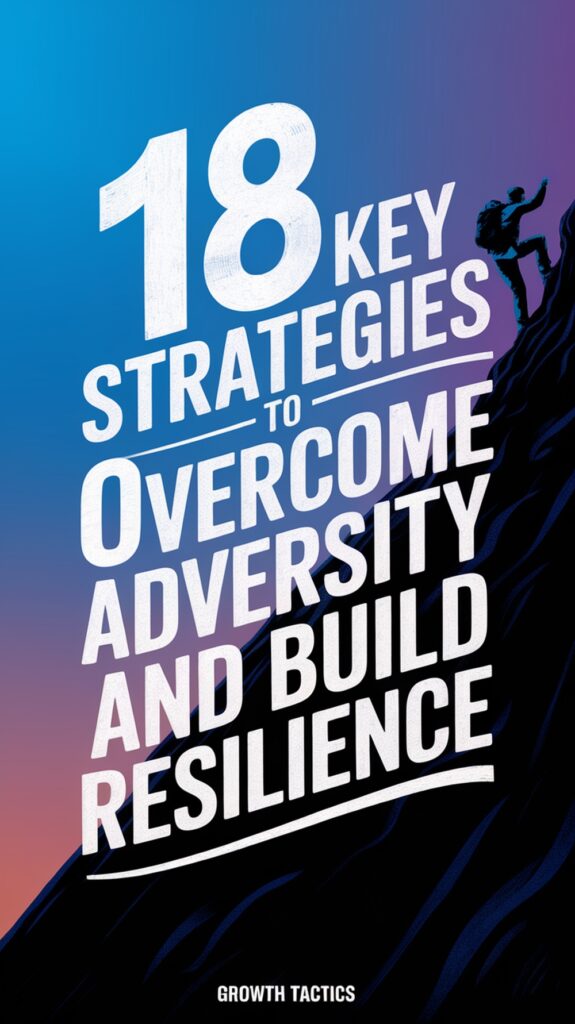Everyone faces adversity in their lives. Some more than others but we all face it. Those who can overcome adversity are far more likely to be winners in life.
What separates those who thrive from those who don’t is resilience, adaptability, and emotional intelligence, turning setbacks into opportunities for growth.
In this article we’ll explore adversity and how you can overcome it to be a winner in life.
Jump To Section
What Is Adversity?

Adversity is a natural and necessary element of the human experience. Adversity is the experience of facing challenges that inhibit or disrupt everyday life. The word comes from the Latin root adversus, meaning “turned against.”
For everyone, no matter who you are or where you come from, adversity is something we all face. It is what makes it such a universal and deeply personal experience. Adversity is a given, whether in our personal lives or our work lives.
It pushes our limits of patience, creativity, resourcefulness, and conviction.
Common Causes of Adversity
Adversity can be caused by countless external and internal factors. Check out the chart below. On the left are some of the common causes of adversity and on the right are things that may feel like adversity in the moment but don’t typically rise to the level.
|
Adversity Example |
Not Adversity |
|
Financial hardship |
Temporary setbacks |
|
Health emergency |
Stubbing a toe |
|
Getting a divorce |
Typical marital arguments |
|
Being laid off |
A slight increase in workload |
|
Surprise large financial expense |
Normal bills |
|
Self-Doubt/Depression |
Normal confidence swings/sporadic stress |
Types of Adversity: Emotional, Physical, Social, and Financial
Types of adversity can be categorized into emotional, physical, social, and financial.
Emotional adversity can be feelings like sadness or anxiety.
Physical adversity can be having an injury or illness.
Social adversity may be something like having your closest friend move across the country.
Financial adversity could be something like having your car break down when you are living paycheck to paycheck.
Understanding these types allows us to tailor strategies for overcoming them.
Why Facing Adversity Matters

Adversity is an unavoidable component of life, but it is crucial in fostering growth and grit. By facing and rising above obstacles, people develop a greater awareness of themselves and their environment. Every fight, no matter how overwhelming, presents a once-in-a-lifetime opportunity for growth.
How Adversity Shapes Personal Growth
Adversity is one of the best teachers of life lessons that you can’t learn any other way. It amplifies compassion, helping individuals relate to others who are going through the same thing.
For example, one who has faced economic adversity will be able to more effectively help a friend going through the same thing. Not only are we better equipped to tackle future challenges, we develop self-efficacy, the belief in one’s ability to overcome adversity.
Look at those who rebuild their lives after natural disasters. Their resilience uplifts the community and the act of coping boosts their self-assurance. This personal growth almost always results in a greater appreciation for life, more meaningful relationships, and a fresh outlook.
Key lessons include:
- Adaptability – Adjusting to change with flexibility.
- Gratitude – Finding joy in small victories.
- Emotional Regulation – Managing reactions under pressure.
Key Mindset Shifts for Overcoming Adversity

Usually, adversity comes crashing through like the Kool-Aid man. How we choose to look at these moments can make all the difference between an adverse experience and a key to growth. With these mindset shifts, every challenge becomes an opportunity to move through the storm and come out stronger, emotionally buoyant and battle-tested.
1. View Adversity as an Opportunity for Growth
Believing that “with every struggle, there is a reward” changes the narrative and allows adversity to be a springboard for growth. For example, being laid off might motivate someone to find a new career altogether, discovering new skills and abilities in the process.
Adversity usually provides surprising lessons, such as the realization of one’s resiliency or ability to find solutions. Keeping hope alive in the midst of adversity is not easy, but a growth mindset makes it possible.
When you believe that skills are developed through hard work, you are motivated to stick it out. Look at Elon Musk, he was removed from being the CEO of PayPal. Did he let this adversity stop him? No he used it as a springboard in his journey to becoming the richest man in the world.
2. Reframe Setbacks as Learning Experiences
Setbacks are lessons, never failures. By seeing them instead as stepping stones, we lessen the frustration and find opportunities to learn and improve our offerings and our work.
Reflection on failures, possibly through journaling, creates an opportunity to reframe in a truly constructive way. This shift in thinking turns loss into groundwork for future victory.
3. Cultivate Gratitude to Shift Perspective
Gratitude helps us look at the positive side when facing a challenge or adversity. Even simple practices, such as writing down three things you’re grateful for each day or writing more thank-you notes, boost mental health.
Gratitude lowers anxiety and increases hope, helping you stay centered when the world spins out of control.
4. Embrace Resilience as a Core Value
Our ability to bounce back from hardship, is a keystone of emotional health. It’s not something that comes naturally, but rather something that develops through consistent practice.
Valuing perseverance, adaptability, and present action over past achievement nurtures resilience.
5. Visualize Success to Stay Motivated
Visualization helps build confidence and improve concentration. Visualizing yourself working through these challenges strengthens motivation and helps ensure that daily actions reflect your bigger aspirations.
Combining visualization with mindfulness practices, such as focused deep breathing, can enhance the practice. Visualizing success is your roadmap to success. It will help get you there and keep you motivated.
Practical Strategies to Build Resilience
Resilience is not something we can build overnight but rather an ongoing, proactive process that prepares us all to withstand hardship more effectively. It’s about developing daily practices, nurturing emotional resilience, and relying on uplifting communities. Here are some specific strategies that can build resilience and how they pay off over time.
Develop a Routine for Stability
Having a routine reinforces a sense of control even when the outside world is chaotic. A consistent daily structure provides a sense of stability, allowing people to feel safe and tuned in. Consider beginning your day with a morning walk/run or maybe some yoga. It’ll energize you and create a great vibe!
Integrating new habits, such as consistent, well-balanced meals and ensuring proper hydration, allows for physical wellness, which directly fuels mental clarity. While routines should be consistent, allowing flexibility often stops routines from feeling rigid or causing overwhelm.
For example, rotating evening activities, such as journaling, a creative hobby, or outdoor exploration, can help you continue to provide a stable routine without it becoming mundane.
Practice Mindfulness and Meditation
By focusing awareness on the present, mindfulness improves emotional regulation and decreases stress. Start with short meditation periods, like five minutes of deep breathing, to slowly get in the rhythm. Methods such as mindful breathing and body scans can be useful in times that feel too big to handle.
With time, consistent mindfulness practice helps you attain better concentration, emotional stability, and awareness, even under difficult circumstances.
Use Journaling for Self-Reflection
Additionally, journaling offers a safe and private space to unpack emotions and monitor personal growth. Questions such as “What did I learn today?” or “What am I grateful for?” help inspire self-reflection and increase mindfulness.
Gratitude journaling specifically helps to reframe your attention onto what’s working, what’s strong, what’s been accomplished. With regular application, this technique cultivates a positive mindset, which is an essential ingredient of resilience.
Engage in Physical Activities for Mental Strength
Physical activities release endorphins, which can help reduce stress levels and improve mood. Be it yoga, running, or dancing, exercise builds physical and mental resilience. Even something as simple as a 15-minute walk at lunch can help to recharge and refresh an afternoon.
Limit Negative Influences and Foster Positivity
Creating an environment of supportive, like-minded people and positive inputs fosters a strong mindset. By reducing access to toxic people and discouraging media messages, you protect your emotional battery life.
Listening to positive affirmations or reading affirming books helps build the muscle of confidence. For example, listening to a motivational podcast while traveling to work or school can create a positive mindset as you start your day.
The Role of Support Systems in Overcoming Adversity

While navigating adversity can seem like an insurmountable storm, support systems provide an essential lifeline.
Importance of Family and Friends in Hard Times
Family and friends create the first line of defense in sending and receiving support. Their emotional support can help make challenges seem less lonely, providing a feeling of connectedness through stormy seas.
Instrumental support including assistance with daily tasks or monetary help tends to relieve short-term stressors. Unreserved and honest communication is essential for nurturing these connections, building mutual trust and understanding.
Whether it’s through simple acts of kindness or sincere expressions of appreciation, deepening these connections now will help them hold up when hard times come around.
Finding Mentors and Professional Guidance
Mentors provide unique wisdom and perspective, providing advice specifically catered to whatever challenges one may be facing. Whether for professional advancement or to overcome adversity and trauma, these professionals open doors with inspiration, leadership development, and mentorship.
For example, a mentor in a relevant field might suggest actionable strategies or connect you with valuable resources, paving the way for growth and resilience.
Building a Community of Like-Minded Individuals
Shared experiences foster empathy and solidarity, making community connections powerful during adversity. Support groups, hobby clubs, or online forums like Reddit can help with encouragement and practical tips.
These spaces of inclusion give community members a place to belong, where they can share information and ideas and celebrate successes.
Seeking Therapy or Counseling When Needed
Professional therapists should be consulted to help address and mitigate extreme adversity. They provide strategies for emotional regulation, thoughtful coping strategies, and even healing from old, unresolved trauma.
With the focused, individualized care that licensed counselors offer, people find themselves on a path toward improved mental and emotional wellness.
Navigating Specific Challenges
Adversity comes in different shapes and sizes, and overcoming adversity is a journey that usually needs very individualized approaches that match the challenges faced. Emotional pain, financial burden, social stigma, and strain on family and career all weigh heavily.
Coping with Emotional and Mental Struggles
Coping with emotional and mental challenges starts with mindfulness, allowing us to center ourselves when fear and anguish take hold. Simple practices such as deep breathing, journaling, or the 5-4-3-2-1 grounding exercise bring awareness back to the here and now.
In addition, acknowledging and validating emotions is important. Addressing feelings rather than avoiding them, allows the process of healing to begin. If the emotional or mental burden is too much, further professional help might be needed.
Cognitive processing therapy and exposure therapy provide organized frameworks for tackling emotional suffering. Creating simple rituals, such as a daily walk or gratitude journal, can provide structure and emotional grounding, too.
Managing Financial Stress Effectively
Financial stress may seem like an impossible hurdle, but there are actions you can take today to regain your financial footing.
Begin with a comprehensive budget to get a better picture of your finances and get back on track. Working together with financial counselors can help identify new methods of tackling existing debt or crafting a plan to build an emergency fund.
Even small changes, such as adopting automated savings or finding ways to spend less on non-essentials, can lead to greater financial security over time.
Overcoming Social Barriers and Isolation
Developing strong relationships and social networks are crucial for addressing this isolation. Becoming a member of a civic organization, volunteering, or engaging in team sports helps build community.
Simple communication skills, such as active listening, can help bridge these barriers. Whether formal or informal, social activities help build connections and reduce isolation.
Balancing Career and Personal Life During Tough Times
Boundaries between work and home help to reduce burnout. Good time management and task prioritization help ease stress levels while allowing you to be productive.
Having self-care practices in place, whether it’s a good exercise routine or a regular sleep schedule, gives you the energy to juggle everything that’s pulling at you.
Measuring Progress and Transformation
Navigating through adversity is an ongoing journey, and measuring our progress is critical to ensuring we maintain this momentum. Measuring personal progress not only brings important personal milestones into focus but also creates momentum and direction.
Setting Achievable Goals to Track Growth
Shifting long-term aspirations into more achievable, short-term goals helps create a clearer path to progress. Setting SMART (Specific, Measurable, Achievable, Relevant, Time-bound) goals keeps you clear and on target.
For example, instead of saying you want to “get your finances in order,” you might focus on saving $100 a month. This makes your goal more specific and measurable.
These actions, though small, start to lay the foundation and give a roadmap when times are hard and challenges seem more manageable than insurmountable.
Reflecting on Past Experiences for Insight
Looking back provides these incredible insights. By examining past experiences, both successes and failures, progress becomes apparent.
Whether it’s through journaling or candid conversations with trusted advisors, reflecting on experiences helps to identify recurring themes and growth opportunities while developing self-awareness.
Questions such as “What strengths or weaknesses contributed to my success or failure?” or “What might I do differently in the future?” provoke reflection and promote critical thinking.
Reflection can turn failures and unexpected events into instruments for building future resilience and adaptability.
Recognizing Small Wins Along the Way
Recognizing small wins along the way helps keep momentum going. Acknowledging progress, however small it may be, can be significant.
Getting a project done, following through on a plan, and overcoming an aversion to something can all be small wins that are meaningful.
These small victories add up, building on one another to strengthen resolve and maintain progress.
Celebrating Personal Milestones
Just like in transportation, significant milestones are worth celebrating. Graduating, getting a new job, or overcoming an injury represent progress.
Celebrating these milestones with friends or family members helps solidify that sense of achievement while serving to encourage further progress.
These kinds of moments serve to connect people to their own journeys and the importance of sticking with them.
Conclusion
Moving through adversity is never an easy path, but it’s one that can result in profound personal development and fortitude. It’s not about how many times you get knocked down, it’s about how many times you get up. Develop these important mindset shifts to build a lasting resilience that will help you face life’s challenges with more strength and purpose.
Adversity doesn’t have to break you; rather, it builds you. With patience, self-compassion, and a willingness to adapt, you can turn even the toughest obstacles into opportunities for growth, creating a life rooted in confidence and perseverance.








